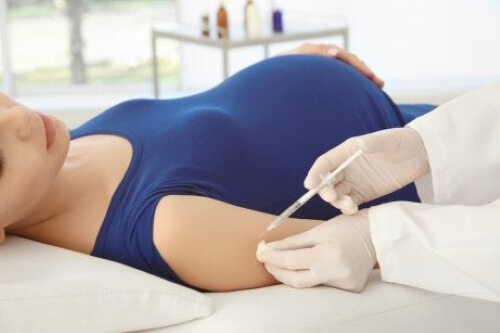Vaccines During Pregnancy: Protecting Mother and Baby


Written and verified by the doctor María Belén Del Río
Vaccines during pregnancy are a tool to help increase the immunity of the pregnant mom and help ward off preventable diseases, in the mother as well as in the fetus. In addition, vaccinations for the mother are also effective at providing some protection for the newborn infant until they’re able to receive their own vaccinations.
Pregnancy is a time when your body undergoes a lot of immunological and physiological changes. These changes can alter the susceptibility of the mother and fetus, and it can become easier for them to suffer from determined infections or an increase in the severity of those infections. Nonetheless, adequate vaccinations can help prevent this.
“Every woman who is presently fertile should be adequately immunized before pregnancy so that during gestation, the woman, as well as the fetus, does not suffer from a preventable disease.”
– Spanish Association of Pediatric Primary Care –
Vaccines during pregnancy play an important role in helping protect mom and child. It’s been demonstrated that the immunization of a mother gives passive protection to the newborn. Especially when facing serious diseases that are common in the first months of life.
Nonetheless, you always have to consider the possible risks in order to minimize any intervention that could be harmful. In general, it’s safer to administer inactive or killed vaccines. The administration of live attenuated vaccines is contraindicated in pregnancy.
Generally, doctors recommend women avoid vaccination during the first trimester of pregnancy. This is to prevent any chance of there being an adverse effect on the normal development of the fetus due to vaccination.
According to the Spanish Association of Pediatric Primary Care, during pregnancy there are vaccines that are especially recommended; some are recommended only in special circumstances, and others are contraindicated.

Main vaccines during pregnancy
The main vaccines recommended during pregnancy are:
1. Inactive flu vaccine
Pregnant women are more susceptible to the influenza virus and to developing complications as a result. For this reason, it’s recommended because pregnant women and newborns are at greater risk of suffering from complications after an infection from the flu.
Studies show there is an increase in birth defects when having the flu in the first trimester, as well as an increase in the number of miscarriages and premature births. There’s also an alarming number of complications that can arise for an infant that contracts the flu in the first six months of life.
As a consequence, doctors will usually recommend the flu vaccine for all pregnant women as they’re a risk group. This vaccine protects the mother and the newborn child who acquires the antibodies from the mother.
Doctors should administer the flu vaccine beginning at 14 weeks of gestation, when the pregnancy coincides with flu season. In the United States, that period runs from October through March. That is the time period with the highest probability of flu virus circulation.
2. Vaccine for whooping cough
Whooping cough is an illness that can be very serious in the first months of a baby’s life. In recent years, there has been an increase in the incidence of whooping cough, even in countries where there are adequate levels of vaccination
“The vaccine for whooping cough is recommended for every pregnant woman beginning at 27 weeks of gestation.”
On the one hand, the vaccine prevents the mother from getting sick and the possibility that the baby might contract it from their mother. On the other hand, the vaccine protects the newborn until they receive vaccinations themselves, thanks to the antibodies the baby inherits from their mother.
3. Vaccine for tetanus and diphtheria
During birth, there is a risk for both the mother and the fetus of becoming infected with tetanus. Therefore, it’s important the mother is adequately vaccinated.
A number of different studies have shown that the tetanus shot administered to the expectant mother reduces the levels of puerperal tetanus and infant mortality significantly.
This vaccine should be administered when it has been more than 1o years since the last dose of the vaccine for the mother. Especially where there is no record that the schedule of vaccinations has been followed adequately.
That is to say, the pregnant woman should already be covered with a tetanus vaccination if she followed the vaccination calendar. If this isn’t the case, she should have it before giving birth to protect herself and her baby.
Vaccines occasionally recommended during pregnancy
There are other vaccinations doctors will sometimes recommend in special situations during pregnancy like the following:
- The vaccine for Hepatitis A
- The vaccine for Hepatitis B
- Poliomyelitis vaccine
- The pneumococcal vaccine
- The meningococcal vaccine

On the other hand, there is also a series of vaccinations often recommended for travelers that doctors occasionally recommend for pregnant women. These are indicated in cases where travel is unavoidable to certain destinations and in situations where the mother is at risk:
- Yellow fever
- Rabies
- Typhoid fever
- Japanese encephalitis
- Central European encephalitis
As a general norm, doctors don’t indicate traveler vaccines during pregnancy. Nonetheless, in some cases, it’s better to administer a vaccine than expose the pregnant woman to a situation of high risk. Your doctor will review your personal situation and make recommendations based on weighing the benefits and risks.
Vaccines contraindicated in pregnancy
There are also vaccines that experts have contraindicated in pregnancy like the following:
- The vaccine against the human papillomavirus
- The MMR vaccine (measles, mumps, rubella)
- The varicella (chickenpox) vaccine
- The vaccine for tuberculosis
- The internasal vaccine for the flu
In general, live attenuated vaccines are contraindicated in pregnancy. Doctors won’t recommend others because there has been very little research regarding their safety.
The side effects of vaccines during pregnancy tend to be minimal and similar to those for vaccines when not pregnant:
- Muscle aches
- Fatigue
- Fever
- Pain and swelling at the injection site
Nonetheless, in each case, your doctor is the one in charge of weighing the risks and benefits. They’ll inform the individual patient of their specific recommendations.
Vaccines during pregnancy are a tool to help increase the immunity of the pregnant mom and help ward off preventable diseases, in the mother as well as in the fetus. In addition, vaccinations for the mother are also effective at providing some protection for the newborn infant until they’re able to receive their own vaccinations.
Pregnancy is a time when your body undergoes a lot of immunological and physiological changes. These changes can alter the susceptibility of the mother and fetus, and it can become easier for them to suffer from determined infections or an increase in the severity of those infections. Nonetheless, adequate vaccinations can help prevent this.
“Every woman who is presently fertile should be adequately immunized before pregnancy so that during gestation, the woman, as well as the fetus, does not suffer from a preventable disease.”
– Spanish Association of Pediatric Primary Care –
Vaccines during pregnancy play an important role in helping protect mom and child. It’s been demonstrated that the immunization of a mother gives passive protection to the newborn. Especially when facing serious diseases that are common in the first months of life.
Nonetheless, you always have to consider the possible risks in order to minimize any intervention that could be harmful. In general, it’s safer to administer inactive or killed vaccines. The administration of live attenuated vaccines is contraindicated in pregnancy.
Generally, doctors recommend women avoid vaccination during the first trimester of pregnancy. This is to prevent any chance of there being an adverse effect on the normal development of the fetus due to vaccination.
According to the Spanish Association of Pediatric Primary Care, during pregnancy there are vaccines that are especially recommended; some are recommended only in special circumstances, and others are contraindicated.

Main vaccines during pregnancy
The main vaccines recommended during pregnancy are:
1. Inactive flu vaccine
Pregnant women are more susceptible to the influenza virus and to developing complications as a result. For this reason, it’s recommended because pregnant women and newborns are at greater risk of suffering from complications after an infection from the flu.
Studies show there is an increase in birth defects when having the flu in the first trimester, as well as an increase in the number of miscarriages and premature births. There’s also an alarming number of complications that can arise for an infant that contracts the flu in the first six months of life.
As a consequence, doctors will usually recommend the flu vaccine for all pregnant women as they’re a risk group. This vaccine protects the mother and the newborn child who acquires the antibodies from the mother.
Doctors should administer the flu vaccine beginning at 14 weeks of gestation, when the pregnancy coincides with flu season. In the United States, that period runs from October through March. That is the time period with the highest probability of flu virus circulation.
2. Vaccine for whooping cough
Whooping cough is an illness that can be very serious in the first months of a baby’s life. In recent years, there has been an increase in the incidence of whooping cough, even in countries where there are adequate levels of vaccination
“The vaccine for whooping cough is recommended for every pregnant woman beginning at 27 weeks of gestation.”
On the one hand, the vaccine prevents the mother from getting sick and the possibility that the baby might contract it from their mother. On the other hand, the vaccine protects the newborn until they receive vaccinations themselves, thanks to the antibodies the baby inherits from their mother.
3. Vaccine for tetanus and diphtheria
During birth, there is a risk for both the mother and the fetus of becoming infected with tetanus. Therefore, it’s important the mother is adequately vaccinated.
A number of different studies have shown that the tetanus shot administered to the expectant mother reduces the levels of puerperal tetanus and infant mortality significantly.
This vaccine should be administered when it has been more than 1o years since the last dose of the vaccine for the mother. Especially where there is no record that the schedule of vaccinations has been followed adequately.
That is to say, the pregnant woman should already be covered with a tetanus vaccination if she followed the vaccination calendar. If this isn’t the case, she should have it before giving birth to protect herself and her baby.
Vaccines occasionally recommended during pregnancy
There are other vaccinations doctors will sometimes recommend in special situations during pregnancy like the following:
- The vaccine for Hepatitis A
- The vaccine for Hepatitis B
- Poliomyelitis vaccine
- The pneumococcal vaccine
- The meningococcal vaccine

On the other hand, there is also a series of vaccinations often recommended for travelers that doctors occasionally recommend for pregnant women. These are indicated in cases where travel is unavoidable to certain destinations and in situations where the mother is at risk:
- Yellow fever
- Rabies
- Typhoid fever
- Japanese encephalitis
- Central European encephalitis
As a general norm, doctors don’t indicate traveler vaccines during pregnancy. Nonetheless, in some cases, it’s better to administer a vaccine than expose the pregnant woman to a situation of high risk. Your doctor will review your personal situation and make recommendations based on weighing the benefits and risks.
Vaccines contraindicated in pregnancy
There are also vaccines that experts have contraindicated in pregnancy like the following:
- The vaccine against the human papillomavirus
- The MMR vaccine (measles, mumps, rubella)
- The varicella (chickenpox) vaccine
- The vaccine for tuberculosis
- The internasal vaccine for the flu
In general, live attenuated vaccines are contraindicated in pregnancy. Doctors won’t recommend others because there has been very little research regarding their safety.
The side effects of vaccines during pregnancy tend to be minimal and similar to those for vaccines when not pregnant:
- Muscle aches
- Fatigue
- Fever
- Pain and swelling at the injection site
Nonetheless, in each case, your doctor is the one in charge of weighing the risks and benefits. They’ll inform the individual patient of their specific recommendations.
All cited sources were thoroughly reviewed by our team to ensure their quality, reliability, currency, and validity. The bibliography of this article was considered reliable and of academic or scientific accuracy.
- Puig-Barberà, J. (2004). Vacunas y embarazo (I): Vacunas indicadas en las mujeres embarazadas. Atencion Primaria.
- Puig-Barberà, J. (2004). Vacunas y Embarazo (y II): La Protección del Recién Nacido Mediante la Vacunación de la Embarazada. Atencion Primaria.
- Bengoa Gorosabel, M.A., Onis Gonzalez, E., Alfayate Miguélez, S. Vacunación en el embarazo. Grupo de Patología Infecciosa de la Asociación Española de Pediatría de Atención Pimaria (AEPap). Disponible en: http://www.aepap.org/grupos/grupo-de-patologia-infecciosa
This text is provided for informational purposes only and does not replace consultation with a professional. If in doubt, consult your specialist.








